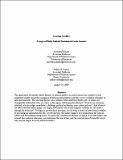|
Reseña:
|
The application of rational choice theories to judicial politics in Latin America has yielded several important insights about the emergence of judicial independence and the success or failure of judges to limit governments. But existing theories also contain certain analytical blind spots: If judges are strategically deferential, why are courts in the region still frequently attacked? If courts are routinely attacked, why do judges nonetheless challenge political authorities over salient policies? And if courts are often attacked and/or judges are largely deferential, why would litigants continue to seek redress through the judiciary? To begin to answer these questions, we develop a model of inter-branch conflict. In providing an explanation for this set of behaviors, the model suggests key implications for judicial reform and for building strong courts. In particular, common institutions designed to insulate judges and expand their political relevance can undermine the rule of law, and the construction of powerful courts may require judges to invite political conflict. |

